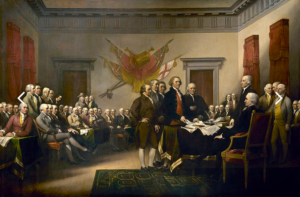Thomas Jefferson was a brilliant but deeply flawed man who viewed only white men as being deserving of the rights of full citizenship. To further his expansionist plans, he began the process of Indian tribal removal from the newly acquired Northwest Territory, which began genocidal policies that ravaged native populations and stripped native people of their rights, homes, and lives. Knowing that slavery was evil, he forced his children born of Sally Hemings, whom he enslaved and impregnated, to live their lives as slaves instead of freeing them.
Jefferson was also a inventor, scholar, writer, and, of course, one of the most prominent of our so-called Founding Fathers. He is considered all-wise and beyond reproach by many Second Amendment fetishists. The so-called originalists on the Supreme Court say we must follow “the founders’ intent,” and base their rulings on the explicitly expressed opinions of rich, white, largely slave-owning men like Jefferson. Justices Alito, Thomas, Gorsuch, and Kavanaugh in particular express a determination to follow the intent of men dead for two centuries unwaveringly, as if they were infallible and holy. This backwards view assumes that no new understanding of humanity or science or the world around us, no historical or cultural shifts—in short, nothing has happened in the past 250 years might justly influence how we see the world.
For all his many grave faults, Jefferson was an educated and worldly man obsessed with expanding his understanding of statecraft, science, human nature, and the world around him. It takes no stretch of the imagination to recognize that the world view of the originalists is antithetical to his values. The idea that all human enlightenment that might influence jurisprudence and improve the new nation he so cherished should end with his own life experience would have shocked and appalled him.
If we play devil’s advocate and assume for a moment that sticking to “the founders’ intent” is a valid way to mete out justice, what Jefferson actually said he believed is of great consequence. If we are to follow his guidance, shouldn’t we consider his intent as expressed in his own writings?
One prominent example of his intent can be found in the words carved into the Jefferson Memorial itself:
“I am not an advocate for frequent changes in laws and constitutions, but laws and institutions must go hand in hand with the progress of the human mind. As that becomes more developed, more enlightened, as new discoveries are made, new truths discovered and manners and opinions change, with the change of circumstances, institutions must advance also to keep pace with the times. We might as well require a man to wear still the coat which fitted him when a boy as a civilized society to remain ever under the regimen of their barbarous ancestors.”

